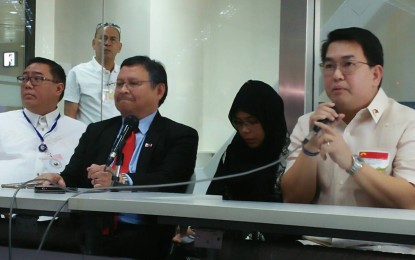
MALTREATED. Fahima Alagasi (2nd from right), the overseas Filipino worker who was scalded with boiling water by her employer in Riyadh in 2014, was emotional as she finally returned home on Friday (April 13, 2018). (Photo by Ma. Cristina Arayata)
MANILA -- Maltreated overseas Filipino worker (OFW), Fahima Alagasi, who was scalded with boiling water by her employer in 2014 in Riyadh, Saudi Arabia, finally arrived home on April 13 at the Ninoy Aquino International Airport (NAIA) on board Philippine Airlines (PAL) flight PR 655.
In 2014, Alagasi's cousin posted some photos of Fahima, showing her burnt skin allegedly caused by her employer.
Alagasi filed a case against her employer. But the latter had filed an oral defamation case against her because of that Facebook post. The employer also filed an absconding case against her.
The case that Alagasi filed against her employer was dismissed apparently due to lack of evidence, and because she was forced to sign a paper stating she poured the water on herself.
Alagasi sought help from the Philippine Embassy in Kuwait. It took four years to settle the case. During those years, she stayed at the shelter that houses OFWs asking for help from the Philippine government.
Last March, Saudi Interior Minister Prince Abdulaziz bin Saud bin Nayef made a courtesy call at the Malacañang Palace. Alagasi's case was raised and discussed. Local authorities said the Interior Minister had intervened to settle the case.
"I am thankful to 'Tatay Digong' (President Rodrigo Duterte), to Prince Abdulaziz, I'm finally home," Alagasi told reporters at the NAIA.
The 26-year-old OFW was still emotional and she almost could not speak. She admitted, however, that the incident was a lesson for her, and that she is willing to return to Riyadh if the need arises.
In a press conference, ACTS-OFW Partylist Representative Aniceto Bertiz said OFWs in the Middle East often deal with the dilemma of facing charges filed by their employers.
"For example, OFWs who were victims of molestation would seek help from the Philippine Embassy. But they would find it hard to seek justice because their employers have immediately filed theft, for instance," he said.
Overseas Workers Welfare Administration (OWWA) Administrator Hans Leo Cacdac noted that all OFWs have the right to ask help from the Philippine government in dealing with cases filed against them abroad.
He said there had been a settlement or mutual agreement to resolve all the cases involving Alagasi and her employer.
Cacdac said the Philippine government provided Alagasi with livelihood assistance in 2014 and in 2017. Alagasi's kids were also given scholarships.
"She will receive another financial assistance when President Duterte meets with her," he added.
Cacdac told the Philippine News Agency (PNA) there was a pressure for concerned agencies --Department of Foreign Affairs and Department of Labor and Employment (DOLE)--as Duterte had wanted to solve Alagasi's case.
Cacdac said there are about 200 OFWs who are currently in the shelter put up by the DOLE and the Philippine Embassy in Riyadh.
"These OFWs are either those who are waiting for amnesty for repatriation, or those who are facing charges filed by their employers," he said.
Cacdac told the PNA that Alagasi's case was prioritized among the OFWs in the shelter, as she was there for the longest time. (PNA)
